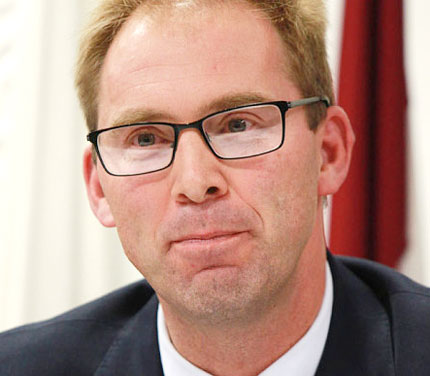
|
 |
 |
|
|
|
|
|
|
|
|
|
|
|
|
|
|
|
|
|
|
|
|
|
|
UK Minister’s Reply to ‘Reprieve’:We Continue to Assist Bahrain‘s ReformReprieve’s report has provoked several reactions by the governments attacked or accused by the report, including the British Government, the Government of Northern Ireland and the Government of Bahrain. In this regard, the British MP Mark Durkan, asked the British Secretary of State for Foreign and Commonwealth Affairs, for his assessment and the British Government’s response to Reprieve’s report on the outcome of the British Government’s cooperation with Bahrain through Northern Ireland Co-operation Overs?as Ltd (NI-CO) in upgrading the capacity of the Ombudsman Office staff.
Tobias Ellwood, the British Secretary of State for Middle East Affairs, responded by saying that “The UK Government continues to assist Bahrain in their reform agenda including by working with the Northern Ireland Co-operation Overseas (NICO) programme”. “Our and NICO’s aims are to assist the Government of Bahrain to bring its justice system into compliance with international standards. All of NICO’s work in Bahrain is regularly monitored and reviewed and continues to comply with rigorous UK human rights standards, which are in line with international human rights law”, added Elwood who concluded that “the impact of their work has been and continues to be positive”. For his part, Simon, Hamilton, the Economy Minister in the Northern Ireland Executive, sent a letter to Reprieve group (published in the North Irish press), rejecting the group’s allegations and its request to suspend cooperation and aid work carried by the Northern Ireland Co-operation Overseas Ltd in Bahrain. The Executive Minister, Hamilton, added that the Northern Ireland Executive was not in a position to suspend the company’s work in Bahrain as it didn’t award the contract, which was awarded by the Foreign and Commonwealth Office. He also defended NI-CO’s work, stating that it “complied with rigorous UK Human Rights standards” and that the impact of its work to date had been positive. The Minister, Simon Hamilton, went on to say that “for as long as these awarding bodies continue to co-operate and identify the need for contracts in countries where reform is required, NI-CO will continue to deliver programmes, sharing the learning and experience of Northern Ireland to change attitudes, culture and behaviour, with the ultimate aim of aligning these countries to the relevant international standards”. In spite of Hamilton’s response, Reprieve insisted on its position and described Hamilton’s response as “deeply alarming”, and accused him of “passing the buck”. Moreover, Reprieve found support from Front Line Defenders, a human rights organisation based in the Republic of Ireland, which joined the media controversy. Mary Lawlor, founder and executive director of Front Line Defenders, responded to the Irish Times article by the North Irish expert, Pauline McCabe, who said that “the sharing of experience, best practice and skills” is critical for progress. Lawlor’s rebuttal argued that “organisations and experts in Northern Ireland who want to see reform in Bahrain?cannot disregard local rights experts in the process. Instead of defending the surface level reforms of Bahrain’s criminal justice institutions, the Northern Ireland Policing Board ought to be consulting with Bahraini human rights defenders.” Bahrain’s Embassy (London) ReplyOn another level, the Embassy of Bahrain in London commented on Reprieve’s report and its feedback. The Embassy’s reply, which was published in the Irish Times, said that “In the past three years with NI-CO’s assistance, as part of the Bahrain-UK technical cooperation program, Bahrain has been able to reshape its human rights landscape and strengthen protections and guarantees.”
The Embassy added “The technical co-operation programme focused on areas of police and security reform and also in areas of the criminal justice system. The Bahrain Independent Commission of Inquiry’s (BICI) report recommended the establishment of oversight bodies, such as the Ombudsman Office – a police and prisoner ombudsman – to which there was no equivalent in the region. As a result, training, standards of procedure and models to adopt were unavailable in the region and there was little, if any, Arabic source material from which to draw”. Based on that, the Embassy concluded that “the challenges of establishing oversight institutions are quite significant. These institutions have had to go through a phase of defining their legal frameworks, recruiting staff and training them, as well as establishing and refining standards of practice and procedure. The ongoing work between NI-CO and institutions in Bahrain is a critical part of the reform process in direct response to the BICI recommendations. For Reprieve – or any other human rights group ? to set an arbitrary timeline for making ample progress is not helpful”. The Embassy’s statement further added that “disregarding the challenges of establishing of such institutions, the steep learning curves, and the complexities of changing social and institutional cultures robs these institutions of any chance of success. In fact, it is counterproductive and has to make one wonder what the ultimate goal is – to seek an end to the shared relationship with parties from the United Kingdom rather than strengthen human rights protections”. According to the statement, joint cooperation between Bahrain and the United Kingdom “has helped to bring about more accountability and oversight in Bahrain, and it would be a shame to see that come to an end over the misguided intentions of people who may have a political agenda that stretches beyond reform. If those calling for reform in Bahrain really want it, they should join in the process and support the efforts of collaboration, retraining and the institution of best practices that result from the c?-operation between the UK and NI-CO, and the Kingdom of Bahrain”. The statement concluded by admitting that “there is an acknowledgement that more needs to be done, but, at the same time, there is demonstrable evidence from the reports of these entities that a lot of progress has been achieved”. |

